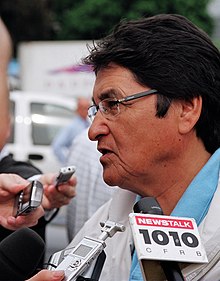Ovide Mercredi
Ovide William Mercredi , OM (born January 30, 1946 in Grand Rapids , Manitoba ) is a Canadian politician. He is a member of the Cree and was from July 1991 to July 1997 leader of the Assembly of First Nations . He has been president of the Manitoba New Democratic Party since 2015 .
Mercredi's mother, a Cree, lost her Indian status because she had married a Métis , so the authorities did not initially consider the son to be a member of the Cree. It was not until 1985 that he was able to enforce recognition. He also denied the Department of Indian Affairs and Northern Development , the responsible ministry, the right to recognition of a person as an Indian .
Mercredi graduated from the University of Manitoba with a law degree specializing in criminal and constitutional law. During this time he became president of Canada's first Native American student organization . In 1977 he graduated and worked as a lawyer. He became a member of the Manitoba Human Rights Commission . In 1987 he advised the First Nations in the negotiations on the Meech Lake Accord , a failed constitutional amendment. In 1989 he was named vice chief of the First Nations Congregation for Manitoba. In 1990 he also played an important role in the negotiations to resolve the Oka crisis . He supported the Cree in the north of the province of Québec against the Great Whale Project , a dam construction project (see Hydro-Québec # failure of the Grande-Baleine project ).
When he was elected Federal Chief of the First Nations Assembly on June 12, 1991 , he campaigned on constitutional issues, for which the debate over the Charlottetown Accord gave him the opportunity. He supported Elijah Harper against the agreement and led a delegation of 60 representatives from their tribes. In 1994 he was re-elected as chief of the First Nations Congregation. He campaigned for the so-called Brighter Futures Program , an initiative against domestic violence, and the Aboriginal AIDS initiative .
Mercredi also established contacts at the level of the UN and intervened on issues of international law . During the uprising in the Mexican province of Chiapas in 1994, he led an Indian delegation and was at the same time commissioner for the observance of human rights on behalf of the International Center for Human Rights and Democratic Development .
Together with Mary Ellen Turpel, he published In The Rapids: Navigating the Future of First Nations in 1993 .
Mercredi is an advocate of peaceful methods of political conflict and was therefore nominated for the Gandhi Peace Prize by the Mahatma Gandhi Foundation for World Peace . He tried to intervene peacefully both in the Oka crisis of 1990 and in the dispute at Gustafsen Lake in British Columbia (1995).
When he demanded the sovereignty of a state from Canada in 1996, some tribes complained that he was accepting Canada's ownership of Native American land. However, the Mohawk rejected this stance, pointing out that they have never lost sovereignty.
From 2005 to 2006 Mercredi ran a candidacy for the New Democratic Party in Churchill , but gave up this project again.
In May 2007, Mercredi appeared in the press demanding compensation payments from the mobile phone companies. He called for air to be seen as a resource just like water, and this is damaged by the rays from the connecting masts.
Since November 2007 he has been Chancellor of the University College of the North in North Manitoba's Sudbury . He is currently chief of the Misipawistik Cree Nation .
Web links
Remarks
- ^ Ovide Mercredi elected president of Manitoba NDP , CBC News , March 7, 2015.
- ↑ In a July 8, 1996 letter from the Mohawk to Ovide Mercredi, the senders, the Mohawk Nation Council of Chiefs , pointed out that the Cree territory they call Kanienkeh (Land of the Flint or Flint) had never been disclosed.
| personal data | |
|---|---|
| SURNAME | Mercredi, Ovide |
| ALTERNATIVE NAMES | Mercredi, Ovide William (full name) |
| BRIEF DESCRIPTION | Canadian politician |
| DATE OF BIRTH | January 30, 1946 |
| PLACE OF BIRTH | Grand Rapids , Manitoba |
